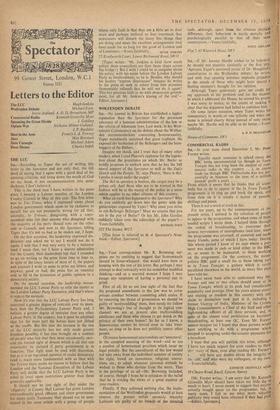Letters to the Editor
Hugh Jenkins Michael Foot, Aspland, A. D. D. Broughton, MP Kenneth Grenville Myer
Divide J. Golding Nicholas Milner-Gulland, J. P. Bardsley Francis J. A. Towsey' Max Harrison Michael Adam Charles Smith
The LCC Wolfenden Debate Joyce Commercial Radio Spanning the Great Opium War Shot in the Arm Jazz Dale Carnegie Dear Money THE LCC
SIR,—According to Taper the act of writing this letter to the Spectator and not only that, the fell deed of saying that 1 agree with a good deal of his amusing criticism, will bring down the wrath of God on my head, if not excommunication into outer darkness. 1 don't believe it.
This is the third time I have written to the press since I became a Labour member of the London County Council in May of this year. The first letter was to The Times, when I expressed views about London government which seem to be exclusive to myself but are not necessarily wrong for all that; secondly, to Tribune, disagreeing with a corre- spondent who felt that anyone who disagreed with. the majority of his party should vote on the other side in Council; and now to the Spectator, telling Taper that it's not so bad as he makes out, I hope.
On the first occasion, the leadership expressed dis- pleasure and asked me to say I would not do it again. I said that I was very sorry to be a nuisance (and I mean that, for I have a sincere admiration for the County Hall leadership) but that I intended to go on writing to the press from time to time as, in spite of the lousy nature of most of it, the papers and journals I write to seem to print my letters, and anyway, good or bad, the press has an essential role to fill in the formation of public opinion in a democratic society.
On the second occasion, the leadership recom- mended the LCC I abour Party to refer the matter to the London Labour Party Executive, and that's where it rests at the moment.
Now it's true that the LCC Labour Party has long exercised a greatet degree of restraint over its mem- bers than the Parliamentary Labour Party and, I believe, a greater degree of restraint than any other Labour Party in thc country, but it must be admitted that for the most part the horses have not jibbed at the snaffle. But this year the increase in the size of the LCC majority has not only made greater freedom possible, it has also brought on a number of people who feel that they must occasionally exer- cise the limited right of dissent which is all that can reasonably be claimed if party government is to function. That right must be used with discretion, but as it is an ingrained essential of social democracy (and is much more fundamental with us than with the Tories) there seems no reason to believe that the London and the National Executives of the Labour Party will decide that the LCC Labour Party is en- titled to insist upon restrictions greater than those generally applicable. It should not be lost sight of that under the 'oligarchy' at County Hall Labour has given London extraordinarily good, efficient and clean government for many years. Tammany Hall should not be men- tioned in the same article with a group of people whose only fault is that they are a little set in their ways and perhaps inclined to fear overmuch that newcomers will 'disturb the many fine things they are doing and upset the excellent arrangements they have made for so long for the good of London and [Taper writes: 'Mr. Jenkins is kind (how much politer these councillors are than those chaps across the bridge!). But I wish I could be as sanguine about his safety, with his name before the London Labour Party as insubordinate, as he is. Besides, why should his leaders "express displeasure" because he writes to the press or seek to extort from him promises (honourably refused) that he will not do it again? This has precious little to do with democratic govern- ment, for all Mr. Jenkins's kissing of the rod.'— Editor,Spectator.]






































 Previous page
Previous page